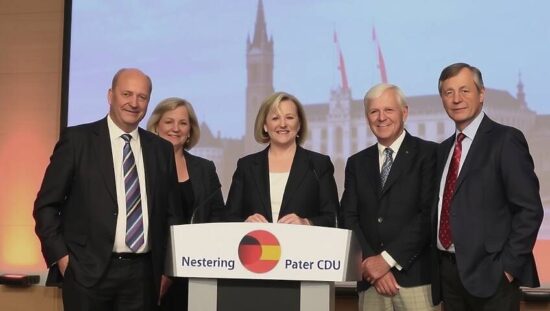Five eastern German CDU state associations have presented an agenda for eastern Germany after the federal election. At the center of the paper, titled “For a New Awakening East”, are theses and demands for improving the economic competitiveness and expanding the transportation axes and infrastructure.
The document is officially to be presented on Tuesday at a CDU election campaign event in Halle (Saale) with the Union’s chancellor candidate Friedrich Merz and the ministers of state Michael Kretschmer (Saxony) and Reiner Haselhoff (Saxony-Anhalt).
Thirty-five years after German reunification, “we have made enormous progress, but we stand before new challenges” said Saxony’s head of government Kretschmer to the Welt newspaper. “We need targeted investments, an innovation-friendly economic policy and a fair recognition of eastern German life achievements.” The goal is to create an “economically strong and internationally competitive eastern Germany with equal living conditions.”
In their agenda, the ministers of state and regional chairmen advocate for strengthening industries that have special importance in the east, such as the chemical, semiconductor and aerospace industries, as well as the optical industry and biotechnology, by “linking established networks with regional development.” Energy-intensive sectors like the steel or chemical industry should be supported “during the transformation process to reduce CO2 emissions.” The ministers also demand a comprehensive expansion of the transportation network.
“For this, we want to bring an agreement with Poland and the Czech Republic to the table in the first months after the new federal government takes office, to quickly expand the road and rail network to the eastern and central European neighbors” the paper states. “The expansion of the road and rail network, the connection of the eastern German state capitals to the German high-speed rail network and the inland connections of the eastern German Baltic Sea ports will be implemented by the federal government outside of the federal highway plan.”
“A economic decline means for most people in western Germany that they can save less, for those in the east, that they have to make sacrifices in their standard of living” said Brandenburg’s CDU chairman Jan Redmann.
“Politics has a credibility problem in the east, people ask themselves if they can make a difference with their vote, in what extent the parties actually differ” said Philipp Amthor, the general secretary of the CDU in Mecklenburg-Vorpommern, to the Welt newspaper. With the eastern agenda, the CDU is showing “what we plan to do and will actually implement.





